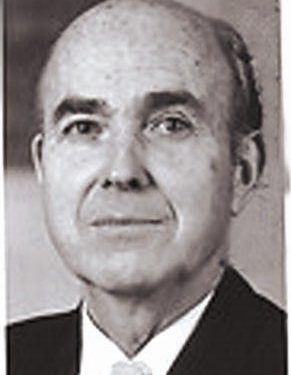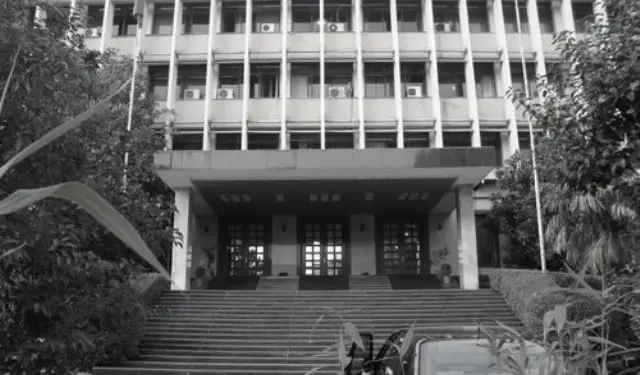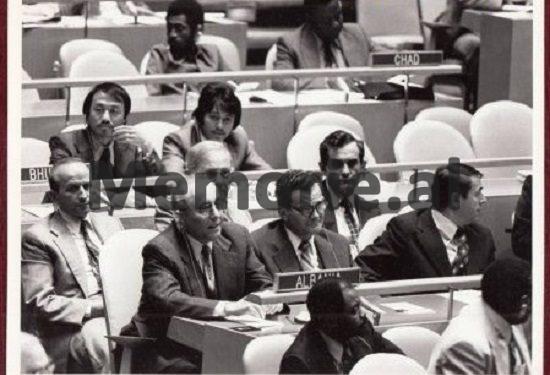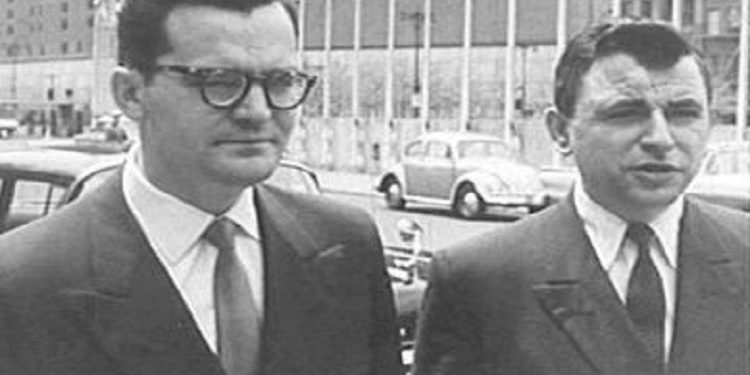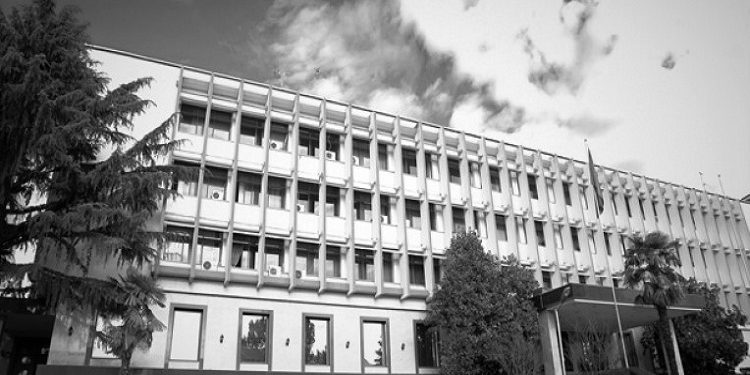By Genc Mlloja
Memorie.al / Undoubtedly, many things remained in your memory in black and white or in many colors from the past, but being present when your boss, with a high state position, is handcuffed, can hardly be removed from your memory. February is the word when the State Security, of the former communist regime, arrested the late former Minister of Foreign Affairs, Nesti Nase, in September 1982, who had directed Albanian diplomacy for dozens of years.
Three of us were present at that event; Vladimir Prela, a scientific associate, was with me in the office of the Institute for the Study of International Relations, like me at that time, and in the office next to it, there was a typist. This institute was located in the building of the ministry, but it depended directly on the late Sofokli Lazri, Ramiz Ali’s closest assistant, for foreign policy, in the Central Committee of the former Labor Party.
It must have been 1 o’clock after lunch, when two or three State Security agents opened the door of our office and addressed Nesti Nase, with the well-known and frightening ritual of that time: “In the name of the people, you are under arrest”! Putting handcuffs behind his back, over which they threw a jacket.
There was an hour and a half that he was talking with us about international problems of that time, when surprisingly (and we learned this later), the entire ministry was empty because the employees had gathered in a meeting in one of the halls on the first floor. The surprise was added to us, that we had not been informed about that meeting, even though we participated in every activity of that kind.
They signaled us to shut up, the Security officers, but anyway, as soon as they closed the door to leave, we tried to see what was going up in the corridor, but in vain; everything had disappeared without a trace.
Of course, the news spread quickly in the ministry, as soon as the meeting, which appears to have been made up, was closed. No one made any comments, except what were considered our “close” friends; they were curious and asked us how the arrest happened. We were telling you, no more and no less, what is written above.
The next day, after the arrest of Nesti Nases, we learned that his wife had hanged herself, because, as was said then, she had previously felt that she might be arrested, rumored to be an agent of the former Yugoslavian UDB. Of course, this was said afterwards.
Unemployed “counselor”…!
Rather, no one, only the late Nase, could know why they had appointed him as an advisor at the Institute, where we were no more than five employees, who were called scientific associates, after he was dismissed from the post of Foreign Minister, on June 30, 1982. Being replaced by the late Reiz Malile, his former deputy.
No motive was told to us, but they organized it in one of the best offices of the Institute, which also published a type of brochure “International Politics”, with various international studies, prepared by us. I mentioned this that Nesti was never told to prepare any material.
What is the truth, he was so modest that, reading what we wrote, it was enough to say “correct”. I am sure that he did it for diplomacy, that he should have had many things to say or make comments when we, of course, were amateurs in front of a career diplomat like him, who had been one of the main actors of Albanian diplomacy, alongside Halim Budos and Behar Shtylla with friends, especially in the United Nations Organization.
And here I can’t help but remember a piece of advice from the distinguished diplomat Behar Shtylla, who when he met me, after I had been appointed as an adviser to the Albanian Mission to the UN, in New York modestly advised me to keep notes, a kind of diary of work. “It will be worth a lot in the future,” he told me. Going back to the subject, even though he was an appointed advisor, we were not told to consult Nase on anything.
But his calmness at the Institute did not last long, because endless meetings of the party organization of the ministry began, which turned into a real trial against Nase. The meetings were led by secretaries of the party committee of Region No. 4, where the party organization and the ministry depended, where some of us who were not communists also invited us. It seems that the work was designed in such a way that, in the first phase, his former subordinates would be held accountable, for anti-state and anti-national actions.
I remember an accusation that can be mentioned; they asked him why he had considered the late Vladimir, the son of Mehmet Shehu, as a good and kind boy. He shrugged, saying that’s how it seemed to him. And he got tired, answering various questions, of course not accepting any accusations of treason or collaboration with foreign agencies. Among the most active was Xenefon Nushi, at that time, his deputy.
It is clear that I did not know many things, but it was noticeable to me that after Nest’s answer, the questioners did not react; there was silence, which Hasan Haxhia, at that time the secretary of the basic organization of party, which dealt with the issues of Yugoslavia at that time. When I remember them now, I personally conclude that the vast majority of the meetings where Nase was accused were missed. They closed with the ritual – reflect!
Abandonment by former subordinates…!
They left Nesti Nasen at the Institute for about two months, as an advisor to give nobody’s “useless” instructions. We were not given any instructions on how to behave with him – whether to sit or not, what to talk about, etc. To two or three friends, I told you that we will have coffee with him, that it makes no sense, even more so when he often came to our office and opened up conversations. In fact, he did not give himself.
There was a buffet in the ministry, where even the titular’s often came. We “young people” of the Institute had to stay away from the bosses. But when Sofokli Lazri, our director, came with us, some approached and wanted to chat. With the passage of time, we also got involved, which made it easier for us to publish our brochure.
We had seen Nase in coffee before as a minister. Now we went with him as our “colleague” from the Institute. Nase was surprised, when we went the first time that apart from us, there was no one else there, because everyone quickly and quickly finished their coffee and left.
His former colleagues, as if they saw the spoon. He did not give himself away, but we were more surprised, who knew little of his connections with them. Anyway, we drank the coffee more quietly, without the presence of others, with a former minister who was specifically looking at abandonment, from those who had done many things before him. I assume that he was also thinking about what was waiting for him next. And in fact, he was so far-sighted, because many beheadings had happened before, in the dome of that regime.
But I don’t forget one thing, and it’s not that my former colleagues at the Institute hadn’t noticed. Among the most regular visitors to Nases, in his office, was the late Xenofon Nushi, the former number two in the ministry. Sometimes, the conversations lasted more than an hour, but we rarely saw them drinking coffee. And among us, there was no shortage of conjectures about this aspect as well. Someone assumed that Chenoja (that’s what his friends called Xenophon) was “brainwashing” Nase, in order to learn about his alleged “hostile activities”.
We did not believe that he suited him as a friend that he was among his harshest critics, in the marathon open meetings of the party organization. This became more believable, after the arrest of Nases, when Cenos did not get a thorn in his leg; on the contrary, he ended his career as ambassador in Paris, where he released the bombshell statement that caused a stir at the time, that Albania would always remain loyal to the ideals of communism.
And this became the reason that the former President of that time, Ramiz Alia (we are talking about the beginning of the 90s when the wind of pluralism was blowing in Albania as well), was forced to return to his homeland, that such a statement, echoed the image that official Tirana was trying to create in the world, especially in the eyes of Westerners.
And the fact cannot be overlooked that Paris had been the point of contact with the United States of America, for the restoration of diplomatic relations, which after that event, was transferred to New York.
He left without giving any “advice”…!
Nesti Nase was careful in discussions with us about international problems, as we were with him. And in fact, this was general, in all state facilities. Public conversations were formatted, in line with the ruling party line. But one detail, I should mention it.
I had done a study of about 40 pages, on the United States of America, that that sector I covered, and among other things, I concluded that there was no danger of any kind of possible US intervention against our country.
Not directly, but not through third parties either, I concluded. It is not the occasion to mention the modest arguments I put forward, rather than the reaction of Nase, the former head of Albanian diplomacy, on this conclusion.
“I can’t put a comma to that thought,” he told me, without further ado. And there was no way for him, much less for me, to dwell on this conclusion expressed in a study for internal use, because for external consumption, “American imperialism”, as well as “Soviet social-imperialism”, continued to appear as the main threat to Albania.
Regarding the developments in Kosovo and Yugoslavia, he was more free in discussions, than even the state positions, they were clearer in support of the Kosovar people, against the Serbian genocide. He did it for the sake of opportunity or, he had some doubts about us, which is quite possible, remembering his situation that he was under surveillance, this is another job, but Nase, he was in tune with our modest thoughts about international developments.
Once I threw it away, that he could publish a study in the brochure we were publishing. But he politely avoided it, saying that he didn’t have any material ready. And unfortunately, he never managed to “prepare” something for our Institute’s brochure, even though no one doubts that one of the most well-known foreign ministers of Albania could have written down many deep thoughts and analysis. Memorie.al




